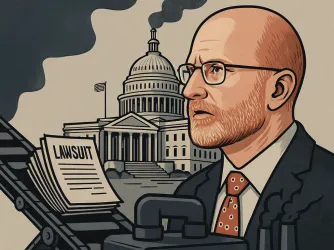Table of Contents
More on Daly
The Torch received several e-mails over the holiday weekend about the recent Warren County Community College post, some of which need to be addressed. The four common themes among the e-mail criticism are: the incident was downplayed by focusing on only one portion of the e-mail; the e-mail is not protected speech because it advocated violence; Professor John Daly’s actions were unprofessional and should be sanctioned; and the call to boycott the event was unethical.
First, it is important to clarify the facts around this entire e-mail controversy. Daly was responding to a solicitation through a personal Yahoo account to a person whom, at the time, he thought was a nonstudent organizer for Young America’s Foundation. Rebecca Beach, the recipient of the e-mail, had never taken a class taught by Daly. Furthermore, according to most media reports, Daly says that he has never met Beach. The only association between these two people is that both are members of the campus community.
I limited my discussion in the previous post to the legal implications of Daly’s most infamous remark mostly because of space considerations, but also because those remarks had garnered the most media attention. Daly did make several other strong statements in his e-mail, including an argument that capitalism has killed more people than communism and a call for a boycott of the event.
Furthermore, even though Daly’s speech could be viewed as a call to perform violent actions, it is protected by the First Amendment. As FIRE’s Guide to Free Speech on Campus points out, the Supreme Court in Brandenburg v. Ohio, 395 U.S. 444 (1969) held, “[F]reedoms of speech and press do not permit a State to forbid advocacy of the use of force or of law violation except where such advocacy is directed to inciting or producing imminent lawless action and is likely to incite or produce such action” (see also Gooding v. Wilson, 405 U.S. 518, citing Chaplinsky v. New Hampshire, 315 U.S. 568, 571). Daly’s speech may have been unprotected if he gave a fiery speech to a crowd of angry soldiers, but this is not the case—this personal e-mail to a student simply does not rise to the level of inciting imminent lawless action.
Now the question turns to whether Daly’s actions were unprofessional. For some authority on this subject, one should turn to the widely accepted AAUP Committee A Statement on Extramural Utterances. This statement reads, “[W]hen [faculty] speak or write as citizens, they should be free from institutional censorship or discipline,” but it does recommend that outside speech “at all times be accurate, should exercise appropriate restraint, should show respect for the opinions of others, and should make every effort to indicate that they are not speaking for the institution.” The AAUP also cautions that disciplinary action should be taken against faculty only when their utterances “raise grave doubts concerning the teacher’s fitness for his or her position,” which is immediately followed by the disclaimer that faculty members “are citizens and should be accorded the freedom of citizens.” The AAUP is correct when it states that faculty expression outside the classroom should be sanctioned only if a very high bar can be reached. Universities should not be in the business of defining terms such as “professionalism” in a back-door attempt to censor extreme or unpopular speech. In a previous FIRE case, Lakeland Community College lodged similar charges against James Tuttle, a philosophy professor, because he disclosed his religious beliefs while discussing his view of philosophy in an introduction on a class syllabus.
Lastly, there is the issue of the call for a boycott. Should a professor, in a position of authority, call for a boycott of a student event? Although there is no evidence that Daly actually called for a boycott, the ethical question still exists. Boycotts are also a form of expression and have been used throughout our country’s history to change public policy. As such, calls for boycotts should be accorded First Amendment protections. However, it would be an ethical abuse if a professor used his position to convince students not to attend a political event. But, especially outside the classroom, it would most likely be unconstitutional to discipline a professor for dissuading students from attending that event.
Although many people (including myself) found Daly’s comments reprehensible, his speech was clearly legally protected. Speech should not arbitrarily be subjected to censorship merely because some consider it offensive. Remember that censorship and oppression do not know political boundaries. A conservative professor who denounces an institution’s affirmative action policy, a libertarian group that decries a college’s speech code, or an ordinary student who alleges bias in the classroom could be just as easily disciplined as a professor who espouses fiery anti-war rhetoric.
Recent Articles
Get the latest free speech news and analysis from FIRE.

Inside the Trump administration’s extortion-industrial complex

In Philly, a new generation finds its voice — and the tools to defend it

Say it with a song
